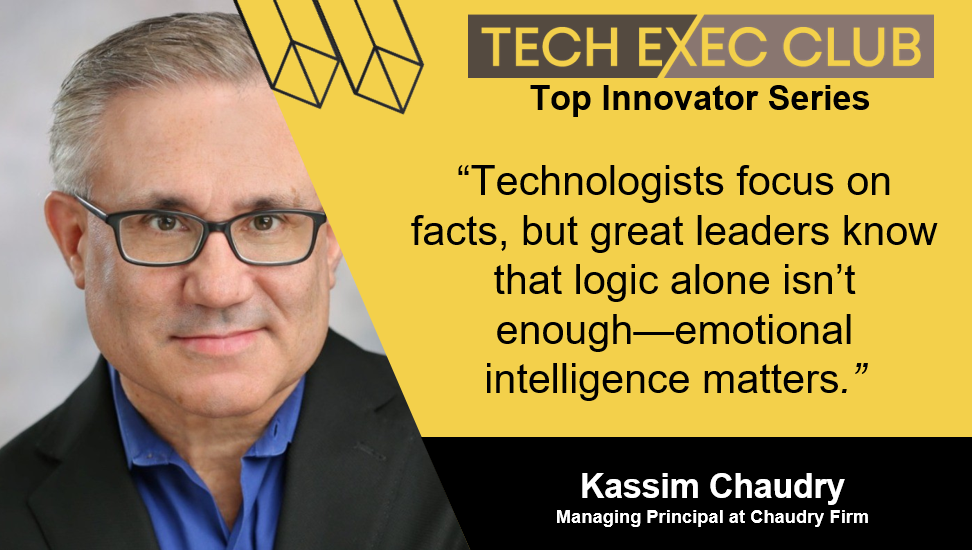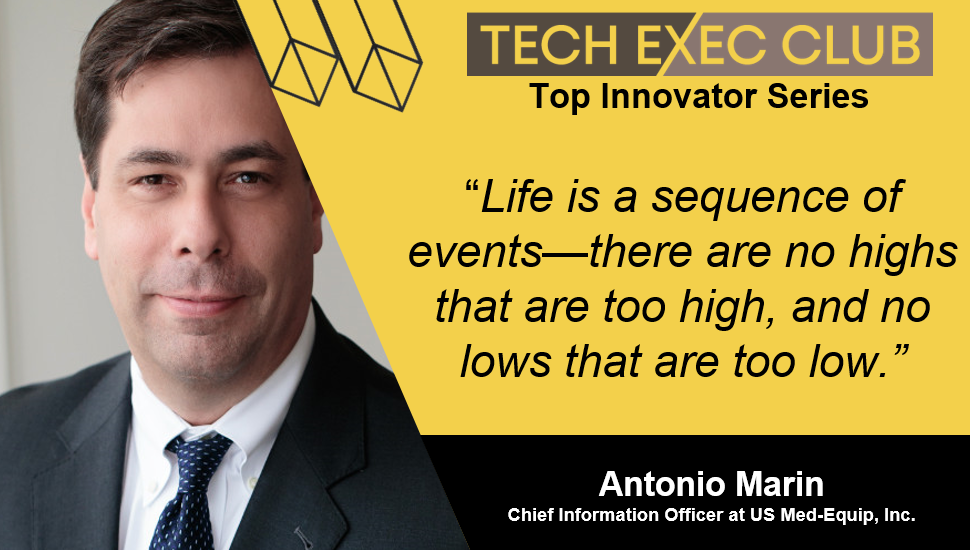Leadership is more than a title—it’s about taking ownership, fostering trust, and maintaining adaptability in an ever-evolving industry. Kassim Chaudry, director of a consulting firm specializing in AI-driven marketing strategies, has spent his career refining his leadership philosophy. His journey from CTO to consulting expert has reinforced a powerful truth: most management challenges stem from leadership shortcomings. Strong leaders do more than react—they create stability, navigate difficult moments, and empower teams to perform at their best.
Kassim shares his leadership insights in an exclusive conversation with Josef Martens for the Top Innovator series. He discusses the importance of taking responsibility, building resilient teams, and finding common ground in high-pressure situations. He highlights the impact of trust and accountability in leading high-performing teams, explaining that a leader’s ability to own mistakes and drive solutions strengthens a company’s foundation.
Kassim also explores the balance between emotional intelligence and logical decision-making, acknowledging that technologists often focus on facts without considering the human aspect of collaboration. Through his experiences—whether resolving crises, mentoring teams, or learning from expert negotiators—he has refined his approach to leadership, ensuring that decisions are made with strategic foresight and adaptability.
This interview uncovers how leaders can cultivate resilience, develop adaptable teams, and foster a culture of ownership and trust. Kassim’s story serves as a blueprint for leadership, offering valuable lessons for anyone looking to lead with integrity and drive sustainable success.
Leadership as Ownership and Accountability
Kassim firmly believes that most management challenges stem from leadership shortcomings. When issues arise, he believes leaders must take full responsibility and ensure that problems are resolved without shifting blame. Rather than pointing fingers, Kassim emphasizes the importance of collective responsibility and finding solutions together.
One key experience that shaped this mindset was a weekend project failure at one of his previous companies. His team had been tasked with a vital cutover, but when Monday arrived, it was clear that the transition had not happened as planned. Despite being on vacation then, Kassim fixed the issue, analyzed what went wrong, and ensured that similar mistakes wouldn’t happen.
This reinforced his belief that leadership requires foresight and proactive planning, ensuring teams have the necessary support and contingency strategies before problems arise. Kassim also points out that when challenges occur, the leader must prioritize making the customer whole—meaning that stakeholders should not bear the burden of operational missteps.
Equally important is giving credit where it’s due. Kassim consciously recognizes his team’s successes rather than taking personal credit for their achievements. Leaders can build trust and foster a collaborative team culture by celebrating wins and acknowledging contributions.
Adaptive Leadership in Challenging Times
Leadership isn’t just about navigating smooth periods—it’s about how leaders react during challenging moments. Kassim applies the 80/20 rule, stating that 80% of managers perform well when business is booming, but only 20% lead when times are tough. This distinction is crucial because authentic leadership is tested during uncertainty, crises, and setbacks.
Kassim argues that leaders must be solution-oriented rather than reactive when failures happen. He believes that maintaining a steady and composed approach is essential, especially when mistakes need to be corrected. Whether dealing with internal issues or customer concerns, leaders should focus on making things right rather than assigning blame.
Kassim illustrates this principle through his approach to customer service. When a mistake causes delays or additional costs, he ensures the customer is compensated—not out of obligation but because trust and reputation matter. Leaders who take responsibility during challenging situations build credibility and long-term loyalty with clients and stakeholders.
Successful leaders can stay calm under pressure, think ahead, and guide teams through adversity, which separates them from those who thrive only when things go well.
Balancing Emotion and Logic in Leadership
Leadership is not just about making fact-based decisions—it requires emotional intelligence, diplomacy, and thoughtful communication. Kassim highlights that many technologists focus purely on logic, facts, and correctness, sometimes overlooking the human aspect of collaboration and negotiation.
A pivotal lesson he learned from a former manager shaped his approach to leadership. His mentor was a master of negotiation, always choosing strategy over confrontation. Even when he was clearly in the right, he didn’t aggressively assert his position or expose the mistakes of the opposing party. Instead, he held back and remained diplomatic, recognizing that preserving relationships was more important than winning short-term arguments.
This experience taught Kassim a valuable leadership skill: bending without breaking. Effective leaders don’t rush to prove their correctness; instead, they consider timing, tone, and the impact of their words. By communicating in a neutral and non-confrontational manner, Kassim has improved his ability to navigate difficult conversations and resolve conflicts without escalating tension.
He emphasizes that leaders must deliver the right message and say it correctly. This ensures stronger relationships, better collaboration, and greater respect within teams and organizations.
The Importance of Thinking Ahead
Leadership isn’t just about reacting to problems—it’s about anticipating industry shifts and preparing for the future. Kassim argues that leaders should always think two or three steps ahead rather than focusing solely on immediate challenges.
Reflecting on the evolution of technology, he notes how entire industries have transformed due to unforeseen innovations. He recalls the storage business as an example. When he first entered the industry, companies focused on building larger hard drives to accommodate growing digital data. However, the rise of cloud computing disrupted the market, shifting data storage from locally installed and managed physical storage to offsite data centers.
Similarly, in the telecom sector, businesses once relied on large-scale mechanical switches housed in vast facilities. With digital transformation, these systems shrunk dramatically, leaving behind empty office floors that once housed large-scale infrastructure.
Kassim stresses that organizations must identify emerging trends and adjust strategies to avoid obsolescence. AI, machine learning, and evolving chip technologies are shaping the next wave of disruptions, and leaders who fail to adapt risk being left behind.
By maintaining foresight, agility, and strategic vision, leaders can prepare their teams and organizations for the future rather than merely reacting to change.
Separating Work from Identity
In today’s work culture, employees often seek personal fulfillment and emotional validation from their jobs. However, Kassim argues that work should not become an individual’s identity. While passion and engagement are essential, he cautions against allowing work to consume personal happiness, relationships, or self-worth.
Over time, work-life balance has become increasingly blurred, with professionals spending longer hours answering emails on weekends and integrating work into their daily lives. Kassim believes this overemphasis on work can be emotionally draining, leading to burnout and dissatisfaction.
He encourages professionals to develop boundaries and ensure that their personal lives provide fulfillment beyond workplace success. While investing in career growth is essential, individuals should not rely on their jobs as their sole source of validation.
Kassim also challenges companies to rethink employee expectations—both in terms of work demands and workplace culture. Employers should recognize that while work is a critical aspect of life, it should not overshadow personal identity and well-being.
By maintaining a balanced approach to work and life, professionals can achieve greater satisfaction, healthier engagement, and long-term career success.
Leadership is not just about executing plans—it is about building trust, fostering accountability, and ensuring teams thrive in uncertain conditions. Kassim Chaudry’s leadership philosophy is rooted in taking ownership, leading with emotional intelligence, and thinking ahead to anticipate industry shifts. His insights reveal that strong leaders do not merely react to challenges but proactively set up their teams for success.
Here’s how you can apply Kassim’s leadership principles in your professional journey:
1. Take Ownership—Be a Leader Who Stands Behind the Team: Accept responsibility for failures rather than deflect blame. Ensure that when mistakes happen, they are analyzed, corrected, and used as a learning experience. Support your team when challenges arise and amplify their successes when things go well. Ensure customers and stakeholders don’t suffer the consequences of operational missteps—prioritize making things right.
2. Lead with Adaptability—Stay Steady in Uncertain Moments: Leadership is genuinely tested when times are difficult. How you lead in a crisis defines your impact. Develop resilience and composure—avoid reacting impulsively under pressure. Implement contingency plans and ensure teams are prepared for unexpected setbacks. Keep a long-term vision, ensuring your leadership decisions protect future sustainability.
3. Balance Logic and Emotional Intelligence: While facts are important, how they are communicated matters just as much. Avoid an aggressive, confrontational approach when negotiating—instead, foster collaboration. Strengthen relationships by adjusting your tone, timing, and delivery of key messages. Recognize that building trust in interactions ensures long-term cooperation and success.
4. Think Ahead—Prepare Your Team for Industry Shifts: Anticipate changes in technology and market trends. Leaders who fail to adapt risk falling behind. Encourage teams to develop forward-thinking strategies, staying two or three steps ahead in decision-making. Invest in professional development that aligns with future industry demands, ensuring continued relevance.
5. Maintain Work-Life Balance—Don’t Let Work Define Your Identity: While engagement in work is crucial, leaders should encourage healthy boundaries between work and personal life. Ensure that employees find fulfillment outside their jobs, allowing them to perform at their best without burnout. While work is an integral part of life, it should not consume one’s identity.
Kassim Chaudry’s leadership philosophy is built on taking ownership, fostering adaptability, and balancing logic with emotional intelligence. His insights challenge traditional leadership models, focusing on accountability, trust, and forward-thinking decision-making. Through real-world experiences, from managing crises to guiding high-performing teams, Kassim has demonstrated that leadership is about making the right decisions and leading with integrity and resilience.
One of his most compelling takeaways is that work should not consume personal identity. While professionals often seek fulfillment in their careers, Kassim believes that proper balance comes from recognizing the distinction between professional success and individual well-being. His message is a powerful counterpoint to modern work culture, advocating for a healthy separation between career ambitions and life beyond the workplace.
By embracing adaptive leadership, emotional intelligence, and future-focused thinking, Kassim offers a compelling blueprint for leaders seeking to build trust, develop strong teams, and drive long-term success. His approach reminds us that leadership is not about titles—it’s about taking responsibility, empowering others, and ensuring sustainable growth in an ever-changing industry.
Want to hear Kassim Chaudry’s insights firsthand? Watch the full, live podcast interview [click here]





